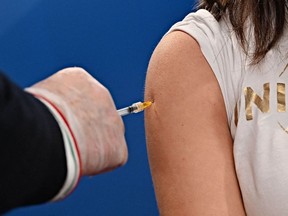
Next month, Brant County Health Unit’s immunization program will start offering routine vaccinations for the current Grade 7 cohort.
Advertisement 2
Article content
But one-third of last year’s Grade 7s in Brantford-Brant still aren’t up to date, according to an immunization program report presented at a Brant County Health Unit (BCHU) board meeting on Wednesday.
It’s unclear why 33 per cent of the 2011 cohort — who are now in Grade 8 — did not receive the meningococcal vaccine, which helps protect against the rare but deadly disease linked to meningitis and sepsis.
In Ontario, it’s routine at 12 months and in Grade 7 through school vaccine clinics that parents need to consent to. However at the end of last year, nearly one-quarter of Grade 7 students in Hamilton hadn’t received it either.
A report from Hamilton’s public health committee in June suggested the lower numbers could indicate “that there remains post-pandemic vaccine hesitancy that requires public health intervention,” The Spec reported.
Advertisement 3
Article content
However, to “state a definite reason” in Brantford-Brant would be “speculative,” Eric Robertson, manager of immunizations and oral health for BCHU, told The Spectator in an email.
The 2011 cohort’s immunization numbers for hepatitis B and human papillomavirus infection were also low — around the 50 per cent mark — but the meningococcal vaccine is the only one of the three required under the Immunization of School Pupils Act (ISPA).
However, while “slightly lower” than pre-pandemic rates, the local immunization numbers are consistent with — and in some cases above — provincial averages, Robertson said.
Students will have until Grade 11 — when the health unit assesses records — to catch-up on the meningococcal immunization, or they may face a 20-day suspension.
Advertisement 4
Article content
Last year, 295 elementary and 272 secondary students in Brantford-Brant received suspensions as a result of ISPA interventions.
Invasive meningococcal disease is rare, but it is most likely to affect children under five, teens and young adults, according to the Ministry of Health.
Infected individuals can die within hours and, even when non-fatal, the disease can have permanent impacts — such as hearing loss, seizures, or brain damage — in up to one-third of patients, the ministry’s website says.
Protecting a community from preventable disease is “reliant on high rates of immunization” to limit the spread, Robertson said.
In addition to hosting catch-up clinics, the health unit will continue releasing the vaccines to primary care providers for patients who prefer to go there.
The immunization program offers regular clinics at the BCHU office, which are open to residents without OHIP or a health-care provider, or who are experiencing other community barriers to immunizations, the report said.
Celeste Percy-Beauregard is a Local Journalism Initiative reporter based at the Hamilton Spectator. The initiative is funded by the Government of Canada.
Article content